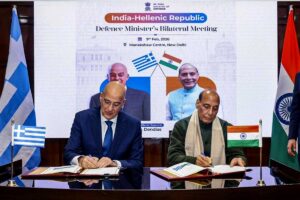Labour’s historic victory in the UK election was underlined by the exit poll, which showed that Kir Starmers’ party won 410 seats in the House of Commons, while Rissy Shunak’s Conservative Party won 131 seats, an all-time low.
Something similar had happened in 1945 under a different system, when Labour had won 245 out of 450 seats. And then there was the election in July.
Specifically, the exit poll shows the following results for the main parties in the House of Commons (out of a total of 650 seats, 326 are needed to form an independent government):
- Labour Party (centre-left): 410
- Conservative Party (centre-right – right): 131
- Liberal Democrats (centre-right): 61: 61
- Reform UK (populist right – far right): 13
- Scottish National Party – SNP (centre-left – Scottish nationalism): 10
- Greens: 2
This is Labour’s first victory in a national general election in the UK since 2005 under Tony Blair.
It is also the first election to be held in July since 1945, and the first in which photo identification was required to vote.

The Brexit that will remain Brexit
Ever since David Cameron led his country to a referendum on whether to remain in or leave the European Union, the Labour Party has expressed serious concerns about the decision and its consequences.
Kir Stammer’s predecessor, Jeremy Corbyn, had lost the confidence of many Britons when he left open the possibility of a new referendum on returning to the Union before the 2019 election.
Today’s circumstances are different: Britain is facing economic difficulties, with the cost of living rising in line with inflation, and there are significant labour shortages as residence permits for Europeans are difficult to obtain and subject to strict criteria.
Despite Labour’s leaks, Keir Starmer has made it clear that “the country will not go backwards as long as he lives”.
This stance leaves no room for second thoughts or interpretations about implementing a return just before the next election in five years’ time.
We have seen a lot in British politics in recent years, but if Starmer decides to change course, he will have to pay a price.
Economy and immigration
Labour has a different economic proposal. Starmer and his team claim that changes should include more recruitment, especially in the National Health Service, and cuts in areas where there is a glut of workers (without making it clear which areas they mean).
On tax, Starmer is not expected to raise taxes, but neither is he expected to cut them, especially with inflation above 2 per cent.
These commitments have won the Labour leader considerable support from the City of London and other business and media players in the country.
However, Starmer cannot keep the country on a steady course unless he increases investment, which will be difficult in the current climate. Russian investment is no longer welcome, while Chinese investors will face opposition, even from within the Labour Party.
On immigration, Starmer has pledged to repeal the controversial ‘Rwanda’ law and to seek new strategic agreements with countries in Africa and Europe to fill labour shortages, particularly in the primary sector.
Labour may have come to power, but it must avoid extremes, coronations and scandals, as the British seem unwilling to give them the same time credit.
Who is Kir Starmer preparing to lead the UK?
Labour Party leader Kir Starmer, 61, is expected to become prime minister, ousting the Conservative Party from power after 14 years.
But for a man preparing to lead the world’s sixth largest economy, there is little information about what kind of leader Starmer will be, or even what kind of person he is.
Starmer has the bluest upbringing of any candidate of his generation, and is the first since the 1950s to hold the title of “Sir” after being knighted by the monarchy. He is a vegetarian and a self-styled socialist, but many on the left accuse him of moving to the right in his quest for power. Meanwhile, friends describe him as a gentle but hyper-competitive football fanatic, while in public he often appears stiff and lacking in charisma.
The Labour Party has expressed serious concerns about Brexit since the referendum. His predecessor, Jeremy Corbyn, had lost the confidence of many Britons by leaving open the possibility of a new referendum. Today, Starmer is making it clear that the country will not return to the EU while he is Prime Minister.
Labour has put forward a different economic proposal. Starmer and his team support increased recruitment to the National Health Service and tax cuts are off the agenda because of high inflation.
On immigration, Starmer has pledged to repeal the Rwanda Act and seek new agreements with countries in Africa and Europe to fill labour shortages.
Starmer grew up in the rural, conservative town of Oxted with his father, a toolmaker, and mother, a nurse. He was the first in his family to go to university, studying law at Leeds University and then Oxford. He worked as a human rights lawyer and became known for his anti-death penalty cases.
Starmer’s supporters say he skilfully mixes progressive values with reality, while his critics say he often changes positions to be liked and to win. He has adopted a zero-tolerance policy on anti-Semitism and has expelled members of the Labour Party.
Critics accuse him of indecision on issues such as tax and support for a ceasefire in Gaza.
Starmer is an Arsenal fan and his wife Victoria works for the NHS. They have a teenage son and daughter.
Kir Starmer is preparing to take over the leadership of the UK at a time of challenge and change, with many waiting to see how his path as Prime Minister will unfold.












